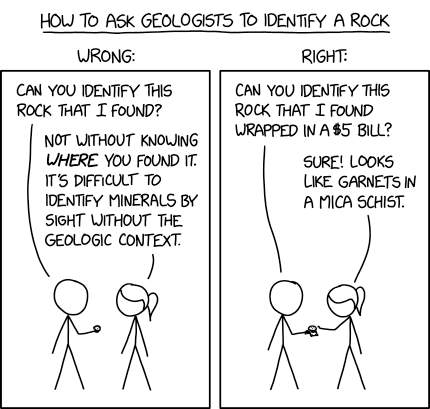Rock Identification

'Is it worth anything?' 'I dunno, is the answer to that question worth another $5?'

'Is it worth anything?' 'I dunno, is the answer to that question worth another $5?'
Geologists, being specialists who study natural features of the earth, are often called on to interpret rock formations, either to understand the formation of our planet, identify suitable sites to mine resources, or explain what the pretty thing you're holding is called. It can be somewhat hard to identify rocks without knowing their original location and the materials that surround them, as this gives information on features that can form similar-looking hard things, such as local lava flows, subduction into layers causing metamorphic rock, or the presence of local sediments.
In the first panel Cueball is seen handing a rock to the geologist Ponytail, who tells him something like the above and concludes that she cannot identify the rock without more information. Randall then insinuates that this issue of provenance is a minor hurdle and implies that the best way to get rocks identified is to motivate the geologist you ask by paying them for the service. As the old adage says, "If you’re good at something, never do it for free." Geologists make their living identifying rocks (among other things), and while some scientists may be excited to discuss their work with a layperson in any context, a shrewd business sense would discourage them from “giving away” such a valuable skill.
In the second panel Cueball has wrapped the rock in a $5 bill, likely to pay/bribe Ponytail, and claims that this is how he found it. Suddenly it is easy enough for Ponytail to identify that it looks like garnets in a mica schist, despite the fact that it was presumably not naturally surrounded by currency. (Furthermore, if a rock was wrapped in paper and put in a hole in the ground, the $5 bill would be covered with dirt and no longer be usable.) Palming people with "tips" like this when trying to sweeten an interaction is a common trope, the implication being that whatever happens to the attached object (a rock, a driver's license, an offered handshake), the cash is discreetly kept by the recipient.
This subverts the expected "correct" way to ask the question, which in these sorts of tips is often made by asking a slightly different question that gives a reason for the person who knows the information to become interested, rather than feel like they are being asked to do work for you. Examples of expected ways to get the information might be to ask pre-emptively, "Can you tell me where this rock came from?", or to draw their attention by being intentionally wrong, e.g., "Why is this granite red?", or even to just provide the kind of fuller details that can give the expert more confidence that any answer they give is more useful to you.
The conversation continues in the title text, with Cueball asking about the economic price of the rock which, unfortunately for him, is quite low as a hand-sized sample. He may find this out by paying Ponytail another $5 bill. Unfortunately for him, he cannot know whether the total outlay will be offset in full (or more) until he has already made the second payment, or gone to the trouble of trying to blindly recoup his expenses from the first gratuity, not even knowing if he's badly over- or under-pricing any offer he might get.